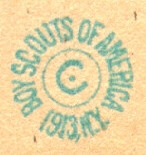

In 1913 the National Council of the Boy Scouts of America copyrighted and published a series of twelve cards. Each heavily ornamented card contained the full text of one of the points of the Scout Law. Eight of the cards contain the initials of the currently unknown artist who designed them.

The cards were published by the Henry Heininger Co. of New York whose name is clearly indicated on the backs along with the message that these were "the only Boy Scout Postcards authorized by the National Council of the Boy Scouts of America."

This reflects the fact that Boy Scouts appeared on privately published post cards as well as on cards produced by rival Scout organizations, and on foreign cards, primarily British and Canadian, which were being sold in this country.

The fronts of the Heininger cards bear a copyright notice in a blue circle.
After the U.S. Congress charter of 1916 granted the Boy Scouts of America protection for their name and insignia, the card backs were changed to remove the printers name,

and the authorization notice mentioned only the Boy Scouts of America.

The copyright notice, in black, became a line in the lower right corner of the front of the card that reads "© 1913 BOY SCOUTS OF AMERICA N.Y."

Other differences are very subtle and may indicate that a different publisher took over the actual printing of the cards.

Whitney Company's back style
Two additional cards, one with the Scout Oath and the other with a summary containing the first sentence of each of the Scout Laws were added within a few years.
|
The set of twelve appeared as No. 3019 for 10 cents in the Fifth Annual Supply Catalog of December 15, 1916. The accompanying illustration clearly showed the straight line copyright notice. As a premium for subscribing to Boys' Life Scouts could choose free merchandise valued up to fifty cents. |
 |
 |
By May 1, 1918, the catalog was issued semi-annually. The set was listed under the same number but contained fourteen cards for the same price. The illustration still showed the straight line copyright notice. |